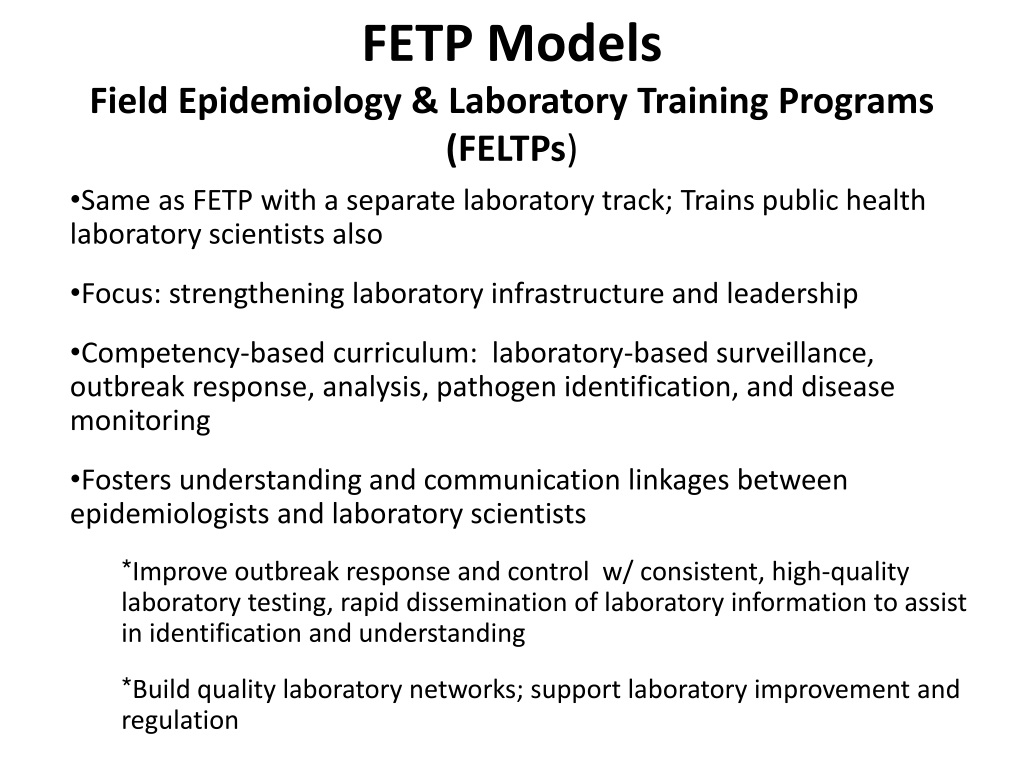Introduction to Field Epidemiology Training

Field epidemiology training programs are designed to equip public health professionals with the skills and knowledge needed to conduct epidemiological investigations, analyze data, and develop evidence-based interventions. These programs typically cover a range of topics, including:
- Epidemiological principles: The fundamental principles of epidemiology, including study design, data collection, and analysis.
- Disease surveillance: The methods and systems used to monitor and track diseases, including surveillance systems, data sources, and analytical techniques.
- Outbreak investigation: The steps involved in investigating outbreaks, including identifying cases, collecting data, and developing control measures.
- Data analysis: The techniques and tools used to analyze data, including statistical methods, data visualization, and data interpretation.
- Communication: The skills and strategies needed to communicate effectively with various stakeholders, including policymakers, healthcare providers, and the public.
Benefits of Field Epidemiology Training
Field epidemiology training offers numerous benefits to individuals, organizations, and communities. Some of the key benefits include:
- Enhanced public health capacity: Field epidemiology training helps build a strong public health workforce that can respond to emerging health threats and protect the health of populations.
- Improved disease surveillance: Trained field epidemiologists can design and implement effective surveillance systems, enabling early detection and response to disease outbreaks.
- Evidence-based decision-making: Field epidemiology training enables public health professionals to collect, analyze, and interpret data, informing evidence-based decision-making and policy development.
- Effective outbreak response: Trained field epidemiologists can lead outbreak investigations, developing and implementing effective control measures to prevent the spread of diseases.
- Collaboration and networking: Field epidemiology training provides opportunities for public health professionals to collaborate and network with colleagues from diverse backgrounds, fostering a global community of practice.
Types of Field Epidemiology Training Programs
There are various types of field epidemiology training programs available, catering to different needs and levels of expertise. Some of the most common programs include:
- Certificate programs: Short-term programs that provide an introduction to field epidemiology, typically lasting several weeks or months.
- Diploma programs: Longer programs that provide in-depth training in field epidemiology, typically lasting several months or a year.
- Master’s programs: Graduate-level programs that provide advanced training in field epidemiology, typically lasting two years.
- Fellowship programs: Programs that provide hands-on experience in field epidemiology, typically lasting several months or a year.
- Online courses: Self-paced online courses that provide flexibility and convenience, covering a range of topics in field epidemiology.
Who Can Benefit from Field Epidemiology Training?
Field epidemiology training is beneficial for a wide range of public health professionals, including:
- Epidemiologists: Professionals working in epidemiology, surveillance, and outbreak response.
- Public health officers: Officials responsible for developing and implementing public health policies and programs.
- Disease control specialists: Professionals working in disease control, prevention, and management.
- Healthcare providers: Clinicians, nurses, and other healthcare professionals working in primary care, hospitals, or community health settings.
- Research scientists: Scientists working in academic, research, or government institutions, focusing on public health research and epidemiology.
FAQs
- What is field epidemiology?
Field epidemiology is the application of epidemiological principles and methods to investigate and control health problems in the community. - Why is field epidemiology training important?
Field epidemiology training is essential for building a strong public health workforce that can respond to emerging health threats and protect the health of populations. - What topics are covered in field epidemiology training programs?
Field epidemiology training programs cover a range of topics, including epidemiological principles, disease surveillance, outbreak investigation, data analysis, and communication. - Who can benefit from field epidemiology training?
Field epidemiology training is beneficial for public health professionals, including epidemiologists, public health officers, disease control specialists, healthcare providers, and research scientists. - What types of field epidemiology training programs are available?
There are various types of field epidemiology training programs available, including certificate, diploma, master’s, fellowship, and online courses.
Conclusion
Field epidemiology training is a critical component of public health capacity building, enabling public health professionals to respond to emerging health threats and protect the health of populations. With the increasing demand for skilled field epidemiologists, it is essential to provide training programs that cater to different needs and levels of expertise. By investing in field epidemiology training, we can strengthen our public health workforce, enhance disease surveillance, and improve outbreak response, ultimately protecting the health and well-being of communities worldwide. Whether you are a public health professional, researcher, or student, field epidemiology training can provide you with the skills and knowledge needed to make a meaningful contribution to the field of public health.
Closure
Thus, we hope this article has provided valuable insights into Field epidemiology training. We hope you find this article informative and beneficial. See you in our next article!